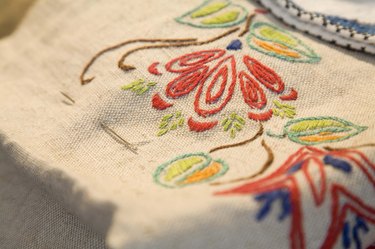
Stabilizers are materials used in sewing to hold fabric flat and inflexible so it is more easily stitched. They are named for the method required to remove them from fabric after embroidery is finished: tear-away, heat-away, wash-away and cut-away. Choosing the best type of stabilizer for your project will improve results. Your choice of stabilizer depends on the type of fabric, your stitching design and the end use of the item that you are embroidering.
Tear-away
Video of the Day
Tear-away stabilizers provide temporary support for embroidery projects. They are best used on firmly woven fabrics and fabrics made from natural fibers. They come in different weights and are offered in both fusible and nonfusible varieties. They are removed by tearing them away from the embroidery, but sometimes cannot be removed completely, depending on the stitch types and brand of stabilizer used.
Video of the Day
Heat-away
Heat-away stabilizers provide temporary support. They are best for delicate and nonwashable fabrics and techniques that require sewing off of the edge of the project, such as lace trims. They come in both woven sheets and plastic films, and are completely removable with an iron. After ironing, woven heat-away stabilizers turn into brown flakes that can be easily brushed off. Heat-aways contain a chemical that is water soluble, so if a steam iron is used, the chemical can transfer to your fabric or other surfaces, causing anything touched to crumble when heated. Heat-away films, often called heat-and-melt, remain underneath the embroidery to give it support when washed.
Wash-away
Wash-away stabilizers are used for temporary support of delicate or difficult-to-mark fabrics such as mesh, and for certain embroidery techniques such as cutwork. They come in paper sheets, plastic film, paper sheets, spray and brush-on liquids, and they are entirely removable with water.
Cut-away
Cut-away stabilizers are used for permanent support. They are best used on knits and loosely woven fabrics. Cut-aways are available in several weights. They are not removed from under the stitching. Only the excess stabilizer is removed.
Tips
With so many varieties on the market, you should experiment with different types before embarking on your final project. Sometimes, you will get the best results from trying several layers of the same or different types of stabilizer. If you stabilize too much, you can tear stitches and break threads. Some fabrics and stitch designs are not compatible regardless of the type of stabilizer used. Keep similar-looking stabilizers in clearly marked storage containers. Heat-away and wash-away stabilizers should be stored in zippered storage bags because exposure to air can change their performance.